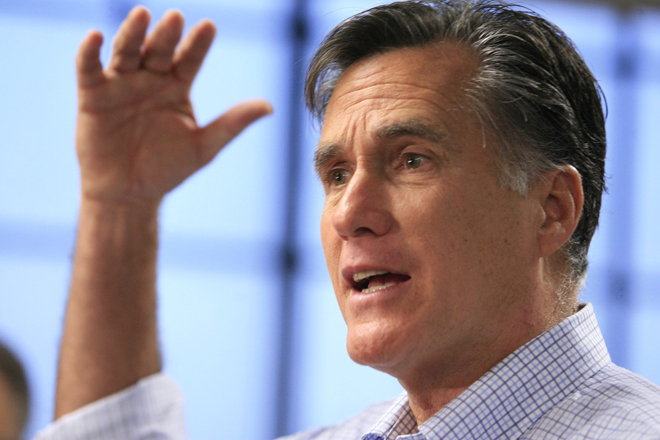Renewed interest in Mitt Romney’s now-closed Swiss bank account has created a parlor game among experts and political junkies who would love to know why on Earth Romney had a Swiss bank account in the first place, and whether he paid taxes to the U.S. government on the money and interest in a timely manner.
Romney’s unwillingness to disclose more information about his finances has fueled speculation that Romney used the account to hide money from the IRS, and may have even had to avail himself of an amnesty program that allowed U.S. owners of certain Swiss bank accounts to come clean to the government without facing legal recriminations. (The Romney camp is now specifically denying that his UBS account was connected to the IRS investigation and the amnesty program.)
But even if Romney paid his taxes as required, the question becomes, Why would a person with national political ambitions open himself to the political risks associated with having a Swiss bank account in the first place?
Plus there’s another hitch: Why run the risk for an account that was relatively small? It was opened on behalf of Ann Romney’s blind trust in 2003, held about $3 million, and generated a mere $1,700 of interest in 2010. Big bucks for ordinary folks, but not for Romney.
High risk/low reward isn’t exactly Mitt’s style personally or professionally. So what gives? Tax experts I’ve been talking to have some interesting — and plausible — theories about how Romney found himself in this mess. Emphasis on “theories.”
Theory #1: Romney was actually helping some of Bain’s foreign investors avoid U.S. taxes and scrutiny — not himself.
One expert on tax strategies employed by high-net-worth individuals like Romney speculated that the purpose of the Swiss bank account was to protect foreign investors seeking to do business with Bain Capital from paying U.S. taxes.
“My instinct on this has been that the foreign accounts probably grew out of Bain business deals in which they were handling investments for foreign investors in a manner that guaranteed the foreign investors that they would not become connected to a U.S. business or otherwise subject to US tax (or IRS intrusiveness),” this expert told me.
“If that was the case, then maybe he left his money overseas to put into new investments. Otherwise the question is why Romney thought a foreign bank was better able to meet his needs that a US bank — especially when all the big foreign banks have branches in New York,” the expert said.
“[I]n the modern world, the is nothing legitimate that a foreign bank can do for a U.S. citizen that a New York bank cannot do just as well,” the expert added. “So, my best [guess] on this is Bain got him in a foreign bank, and he did not want to sever ties with the Bain world, or he failed to think about the political implications.”
Theory #2: Romney and his financial advisers lost track of the Swiss account.
I know that sounds implausible but stay with me here.
Theory #1 would explain the account’s origins. And if Romney paid taxes on the account when due, as he now claims, then it would moot concerns that he was hiding money from the IRS. But then why did his trustee keep the account until 2010, through an initial run for the presidency in 2007 and 2008, right up until he entered the 2012 GOP primary? And if everything was on the up and up legally, it doesn’t really explain why he’s been so reluctant with information about the account itself
Daniel Shaviro — a tax expert at NYU who’s been documenting and explaining Romney’s tax strategies — floats this theory: What if Romney’s wealth empire is so vast that his money managers simply overlooked the trivial interest he earned on this account until the federal government came knocking at UBS’ door.
“Obviously, no one would use a Swiss bank account primarily in order to avoid U.S. tax on one’s interest income, at so low a rate of return,” Shaviro told me. “You might have a case where the tax guys in his operation weren’t consulted on the Swiss bank account, since it wasn’t done for tax reasons, and didn’t learn about or at least prioritize it.”
“[H]e was earning relatively trivial interest from the account. … This suggests to me that the interest may have been a side issue, and not have gotten the serious attention that he and his people no doubt gave to the [Individual Retirement Account], the Caymans entities, etcetera,” Shaviro speculates.
Whatever Romney’s investment team may or may not have been telling his tax team, presumably at some point his political team got wind of the Swiss bank account and recognized how damaging it could be to his presidential ambitions. But because Romney has refused to release more information about his finances, answers to questions about his wealth, and particularly about this one account, are black boxed. That’s left him vulnerable to a slow drip of dark-toned speculation from his political enemies. As the experts I’ve spoken to suggest, there could be less nefarious explanations that place Romney on the right side of the law — but still expose to public scrutiny the tax avoidance schemes Romney used and that are only available to the very wealthiest Americans.






